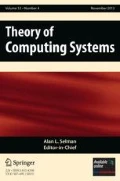Abstract
Abstract. We consider generalized first-order sentences over < using both ordinary and modular quantifiers. It is known that the languages definable by such sentences are exactly the regular languages whose syntactic monoids contain only solvable groups. We show that any sentence in this logic is equivalent to one using three variables only, and we prove that the languages expressible with two variables are those whose syntactic monoids belong to a particular pseudovariety of finite monoids, namely the wreath product of the pseudovariety DA (which corresponds to the languages definable by ordinary first-order two-variable sentences) with the pseudovariety of finite solvable groups. This generalizes earlier work of Thérien and Wilke on the expressive power of two-variable formulas in which only ordinary quantifiers are present. If all modular quantifiers in the sentence are of the same prime modulus, this provides an algorithm to decide if a regular language has such a two-variable definition.
Similar content being viewed by others
Author information
Authors and Affiliations
Rights and permissions
About this article
Cite this article
Straubing, H., Thérien, D. Regular Languages Defined by Generalized First-Order Formulas with a Bounded Number of Bound Variables . Theory Comput. Systems 36, 29–69 (2003). https://doi.org/10.1007/s00224-002-1035-9
Published:
Issue Date:
DOI: https://doi.org/10.1007/s00224-002-1035-9



